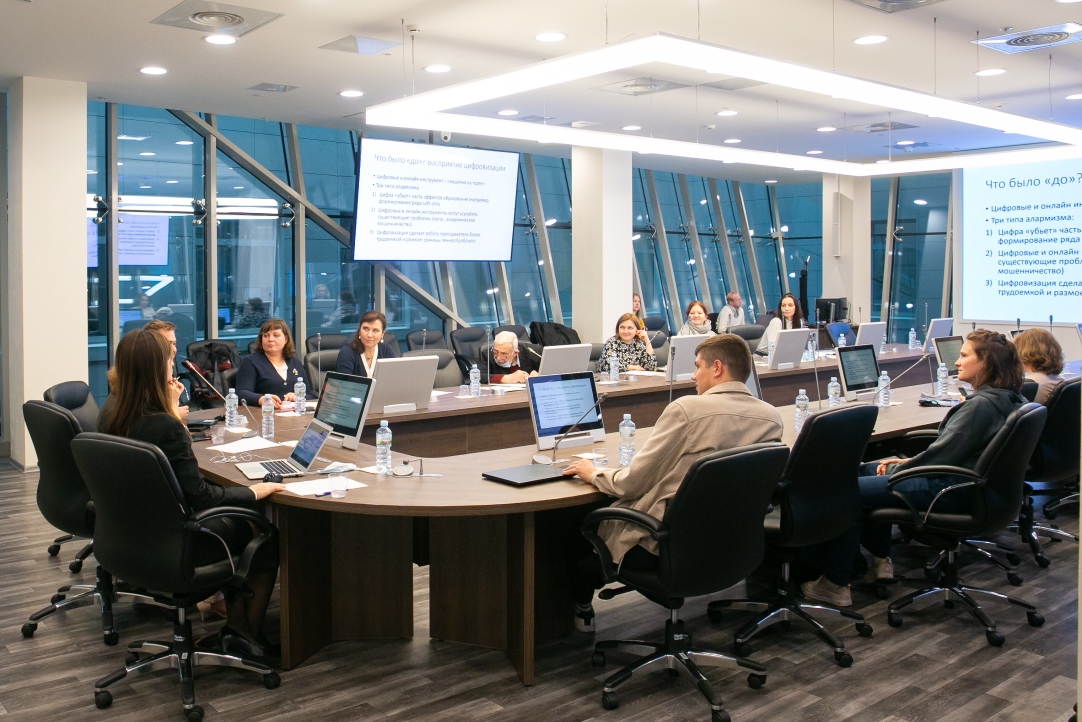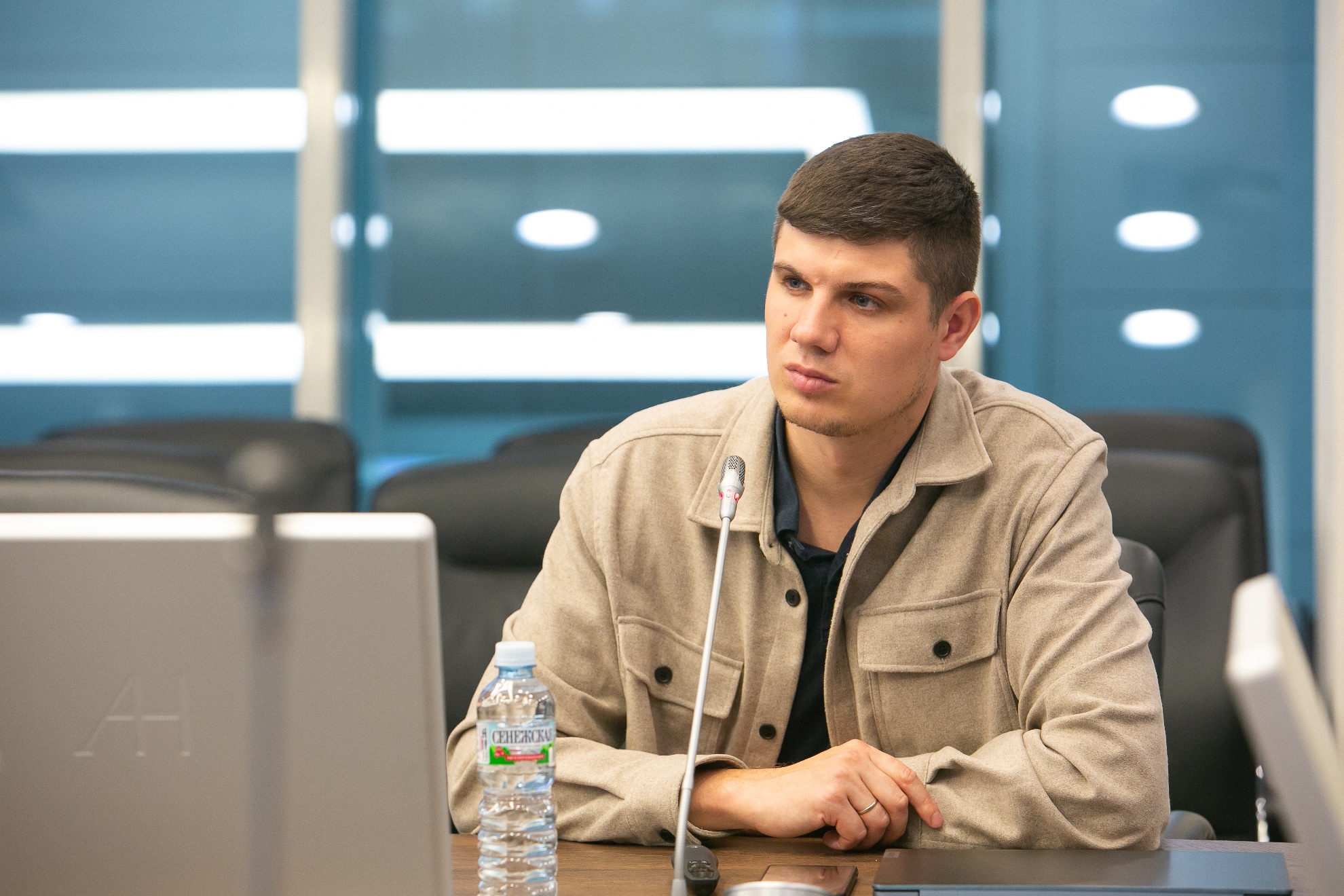‘Teachers’ Day 2021 Inspires to Search for New Solutions’

A two-day seminar called ‘Teaching and Studying in the Time of Digital Transformation—Modern Approaches and Practices’ was held on Teachers’ Day 2021 as part of the Teach for HSE project. Speakers and participants shared ideas and insights that had emerged during the recent period of remote and hybrid teaching, discussing issues of digital etiquette, psychological aspects of online teaching, and new trajectories and opportunities for teachers’ professional growth.
The seminar was held in a hybrid format, with some of the participants in a meeting room and others watching and speaking online. Oksana Chernenko, Director for Innovations in Education, HSE University, moderated the event.

Top-Down and Bottom-Up Approaches to Digitization
The participants were presented with the results of a large-scale survey titled ‘The quality of education in Russian universities. The pandemic lessons learned’. The survey was conducted by a team of researchers from 13 Russian universities under the auspices of HSE University and Tomsk State University.
Evgeniy Terentev, Director of the Centre of Sociology of Higher Education, spoke about the conclusions of the sociological survey’s three large-scale waves, which focused on students, doctoral students, and teachers.

Three quarters of students now believe in the efficiency of remote learning, compared to only a quarter of their peers before the pandemic. Over half the students see the hybrid format of studying as the most productive way of acquiring new knowledge. Almost three quarters of teachers agree with them, saying that this is going to be the new teaching reality, while before the pandemic only a third of teachers held this point of view.
According to Evgeniy Terentev, both students and teachers believe that online learning will never provide high quality education, as it jeopardizes the social interaction processes inside universities and limits the opportunities for real interpersonal communication.
Online learning is also thought to exacerbate academic dishonesty, a problem that should be addressed by new methods of testing. Students’ psychological wellbeing and mental health can also suffer as well. The survey reveals some alarming results, with 20% of students exhibiting symptoms of moderate or severe depression. A modernized infrastructure, additional psychological support, and efforts to improve teachers’ skills are all needed to address this problem.
Ivan Gruzdev, Director for Internal Monitoring and Student Academic Development, HSE University, says that a survey conducted before the transition to online studies shows that teachers see educational digitization as a process implemented in two opposite ways: using top-down and bottom-up approaches. The top-down approach is where the university administration propagates digitization tools (corporate systems, a series of online courses, etc), while the bottom-up approach is where teachers acquire students’ habits of using online tools such as Telegram to chat with students, which can be beneficial for the teaching and learning processes.

Ivan Gruzdev points out that, on the one hand, teaching methods have hardly changed in online studies—we see the same methods and approaches used in Zoom as in the usual offline format. On the other hand, the fact that most teachers are now using videoconference calls shows their professional enthusiasm. Many instructors were quick to learn new digital tools that increased students’ involvement. They were willing to experiment with new systems and platforms, adapting rapidly to the new reality without any top-down directives.
Efforts that Pay Off
HSE First Vice Rector Vadim Radaev held a workshop to share his experience in using Perusall, a social reading platform involving students into reading and discussing difficult academic tests. Prof. Radaev has been using this platform for over two years. He was first to integrate this platform into his courses at HSE University. Nowadays, other HSE teachers are using Perusall too. This is an administration-friendly academic tool and it takes just a few minutes to learn how to use it.

Prof. Radaev admits that admits that these days fewer and fewer students read difficult academic texts. However, education is based on such texts, especially in social sciences and humanities. These texts are an ‘attention-improving facility’ that help develop analytical abilities, critical thinking, and the ability to filter large amounts of information and look for the key message. We need to encourage students to develop a meaningful attitude to texts and work with the words on their own rather than just carelessly flicking through pages.
According to HSE First Vice Rector, Perusall is a platform that can perform all these functions. The instructor uploads texts and students comment on them, while the platform grades each student based on their participation and presents the instructor with a summary data sheet. The instructor can write comments too. They can see who is participating in the discussion and who prefers to keep a low profile. The tutor can praise the most active participants and those who suggest the smartest comments. Of course, the platform is unable to assess the quality of the comments, so this remains the teachers’ job.
As Prof. Radaev says, now students can’t help but open the texts before the class, highlight passages, comment on them using their own ideas, and practice their academic writing skills. ‘This allows us to engage even those students who are not particularly attracted to public speaking and prefer to keep silent in the class.’
Perusall offers instructors new opportunities to monitor students’ work and change the nature of academic seminars.
‘The teachers’ workload has increased: I had to work Sundays, commenting on two texts per topic. It takes time, but I’m happy because I know that these efforts paid off’, summarized Vadim Radaev.
Life hacks and Insights
The Digital Teaching Consultants project demonstrated some of the best practices of online teaching. The project was launched in May 2021, and 25 shortlisted teachers from all four campuses began helping their colleagues to work more effectively online using digital technologies.
Vladimir Pavlov, Associate Professor of the Department of Foreign Languages, HSE Campus in St. Petersburg, shared the results of some research into the effective use of video cameras in online classes and provided a list of recommendations. As the teachers' poll shows, almost all of them believe it necessary for students to participate in such classes with their cameras on. To achieve this, you need to provide a comfortable environment during the class, discuss the rules of using cameras with the students, teach them how to set a background and show a special introductory slide reminding them to turn on their cameras at the beginning of the class.
Natalia Shitova, Senior Lecturer, HSE Department of Constitutional and Administrative Law in Nizhny Novgorod, spoke about the possibilities MS Teams offers for student encouragement. She thinks that likes, stickers, emojis, and gratitude expressed in chats are a "soft power" that is more effective than critical remarks when communicating with students. It does not take any effort to click the ‘like’ button, but in doing so, the teacher sends a signal as to whether a student is on the right track and should proceed with their chosen course. The online world can often lack emotion, so the ‘likes’ have a positive effect on the atmosphere and work in general.
'I've launched an award ‘For Courage,' Natalia Shitova says. 'Students can earn it by always turning on their camera or doing so more often than others. Many people later regretted not turning on their cameras when giving feedback on this commendation. This is a noncommittal tool that does not influence students' grades but helps the teacher indicate which of their students are doing what they should, and which are not.'
Marina Pletneva, visiting lecturer at the HSE School of Foreign Languages, shared her hacks and tools for involving students in an online class. For example, a class should start with something positive to make students feel comfortable. The teacher may ask them to show personal photos relevant to the topic discussed: this is a powerful tool for boosting motivation or enhancing contact with the audience. Searching for necessary items in the room is another method: if design is being discussed, you can give students 30 seconds or a minute to find a classic design item.
According to Oksana Chernenko, 'through lecturers' interaction, one needs to select something that is going to help achieve results within their specific course' out of the multitude of tools that assist her colleagues work in a digital environment. She reminded participants that the HSE Digital Teaching Consultants project is being run now and that anyone can ask for support. The offer to join the pool of enthusiasts that have taken on the responsibility of advising their colleagues in addition to their teaching workload is still standing for all teachers.
Some of the seminar’s participants shared their impressions.

Lev Bardin, Associate Professor, School of Court Proceedings and Criminal Law, Faculty of Law, HSE University
Undoubtedly, some very hot topics were chosen for discussion at the Teachers’ Day 2021 event. The discussion was very honest, and the speakers' reports were to the point and extremely informative. I particularly liked the speeches of Evgeniy Terentev, Maria Lytaeva, Andrei Dementiev, and Alexander Varnavsky.
Almost all the presentations gave me a lot of food for thought, and ideas which can be used when working with students. A special discussion was devoted to digital etiquette. I see this direction of research as a highly relevant one, since I am a member of the working group that has developed the Rules of Behavior for Lawyers in the 'Internet' Telecommunication and Information Network.
I believe we should continue this discussion. A comparative analysis of the advantages and disadvantages of various IT programs and technologies should also be carried out. It would make sense to gather together the various reports and presentations: this would make for a useful methodology book, which could be referred to regularly.

Tatiana A. Anisovets, Senior Lecturer, St. Petersburg School of Economics and Management, HSE University
Teachers’ Day 2021, held on Pokrovka Street, showed that the problems I face every day when working online are also common for other lecturers, even quite renowned and respected ones. I believe we can overcome these difficulties together. Almost all the participants of the seminar spoke inspiringly of the insights that have helped them enhance the quality of distance teaching, so this optimism is not baseless.
One more conclusion I came to after the seminar is that sometimes the online format provides more opportunities than traditional in-class teaching. Chats, polls and other forms can involve students in the learning process. Every presentation showed me something new. For example, I will definitely try working with academic texts using the Perusall platform, which Vadim Radaev spoke about. And although I'm not ready to use all of the suggested tools, I received detailed information about them and I know what direction I should be going in.
It’s already been a year and a half since we moved away from the traditional form of teaching. Now my colleagues know, or at least have heard of, the countless platforms that allow us to brighten up the daily online grind. We have tried out various learning tools: there are different technologies that can be used to give a lecture. It is probably time to make some choices. As Oksana Chernenko said, we're waiting for research on the efficiency of various tools.
I liked the format of the Teachers’ Day, with a variety of discussion topics and forms of presentation (research reports, workshops, discussions). In addition, I also enjoyed the opportunity to network both on a professional and personal level.

Olga Molyarenko, Associate Professor, Department of Local Administration, Faculty of Social Sciences, HSE University
The topic of Teachers’ Day 2021 has been discussed countless times over the last year and a half. However, the seminar turned out to be unique, informal and full of colleagues' real opinions and emotions. Every one of us shared personal experiences, success stories and failures. This was the format that best fitted the content.
We learned about specific tools and solutions that can be used for online teaching. We studied cases where a solution or a lecturer's action involves students and helps them understand the material, and conversely, cases where the solution or the action has the opposite effect and failed to work. Thanks to the reports on the shared context of changes and the university community’s attitude to them, we were able to compare our position and our students' opinions to nationwide trends.
Immediately after the seminar, I used the option of “praising” students in MS Teams; Natalia Shitova had told us about that one. The first impression was positive; the praised people were delighted with this feedback. I also noted many other useful tools and methods but have decided not to use them until I solve some organizational issues and master their functions. For example, it would be great to emphasise the need for students' cameras to be on in the curriculum, to try using Perusall for more important texts, and to enhance interaction via the latest tools available for student group work.
Overall, Teachers' Day 2021 has inspired me to search for new solutions. I have a lot of plans, and I hope that I'll have enough willpower to follow them through. I'm sincerely grateful to the organizers, speakers, and my colleagues who shared their experience in the form of feedback.

